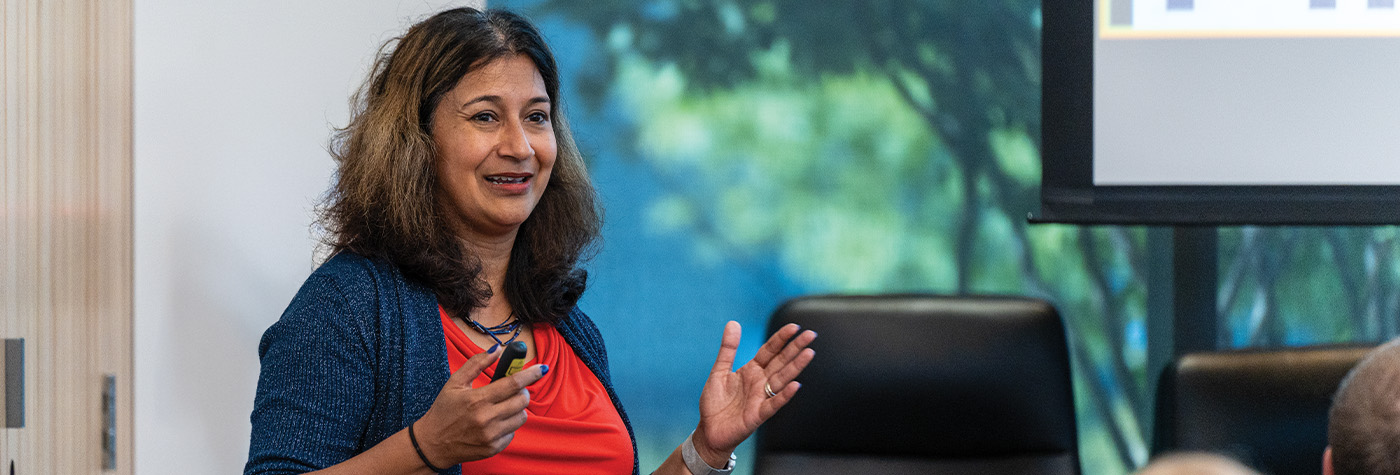Extinguishing Tobacco Use

MARKEY RESEARCHERS WANT TO STAMP
OUT SMOKING AND ITS HEALTH RISKS
While smoking rates have gone down in suburban and urban areas in recent years, rates haven’t declined as much in rural areas. The University of Kentucky is home to a new research center focused on changing that.
The Appalachian Tobacco Regulatory Science Team (AppalTRUST) will study tobacco product use and the impact of regulations in Appalachian Kentucky.
“There’s still a large disparity, but it’s under-recognized because rural communities are so diverse and patterns of tobacco use in those communities are different than in urban communities,” said Shyanika W. Rose, PhD, MA, associate professor with the College of Medicine Department of Behavioral Science and the Center for Health, Engagement and Transformation (CHET).
Tobacco Use in Rural Kentucky
AppalTRUST is funded by a $19 million cooperative agreement from the National Institutes of Health (NIH) and the Food and Drug Administration (FDA). Researchers will examine how differences in rural areas impact access to tobacco products and use, along with the potential impacts of proposed new regulations.
The research will focus on two areas of Kentucky — three counties in northeast Kentucky on the outskirts of an urban area and five more rural counties in southeast Kentucky.
AppalTRUST includes:
- A large survey project
- An investigation of marketing to 18- to 24-year-olds
- A study looking at the impact of proposed tobacco product regulations in rural Kentucky
Retail audits will look at how product availability varies depending on how rural an area is and ways to consider regulations that might reduce tobacco harms in those communities. People living in these local counties have been hired to collect the field data.
Rural communities often face limited access to tobacco cessation resources and health care support, making it more challenging to quit smoking.
“The tobacco industry has very specific ways they target their marketing in rural communities to be appealing and to make tobacco very prevalent and very cheap,” Rose said.
The information learned from AppalTRUST will apply to many other rural areas across the U.S.
“What we discover can affect national tobacco policy,” said Mikhail Koffarnus, PhD, vice chair for research and associate professor in the Department of Family & Community Medicine.
AppalTRUST will give the FDA realworld data on how tobacco products are used and marketed in rural Appalachia, according to Ellen J. Hahn, PhD, RN, FAAN, and AppalTRUST associate director.
“Rural populations are often ignored in studies of tobacco use and tobacco marketing,” Hahn said. “AppalTRUST will benefit the entire country as it will shine a light on the diversity of rurality and inform the policies that regulate tobacco products.”
Markey Leader Spearheads National
Program to Help Smokers Quit
Patients who use tobacco don’t just have a higher risk of getting many cancers. They also have worse survival rates for any cancers they do develop.
A national program led by the American College of Surgeons (ACS) has helped cancer programs build and improve their smoking cessation services. Beyond Ask is a follow-up to the ASC Commission on Cancer (CoC) Just Ask quality improvement program. Both programs were spearheaded by Markey Cancer Center thoracic surgeon and researcher Timothy Mullet, MD, MBA, FACS, during his time as CoC chair. Mullett is the medical director of the Markey Cancer Center Affiliate and Research Networks.
One Step Further
Just Ask surveyed how programs assess and treat patients who smoke. Beyond Ask goes further, asking programs to take steps to help patients quit smoking.
The CoC created resources for participating sites and offered webinars and incentives for participation.
“We provided them the tools in an easyto- use package that they could deploy in very small programs all the way up to large academic facilities and network hospitals,” Mullett said.
Tobacco research and treatment leaders at the University of Kentucky contributed to the project’s design.
After one year of the Beyond Ask quality improvement program, nearly 80% of cancer programs offered patients help. The success of Beyond Ask also led the CoC to begin developing nationwide tobacco treatment standards for member institutions.




